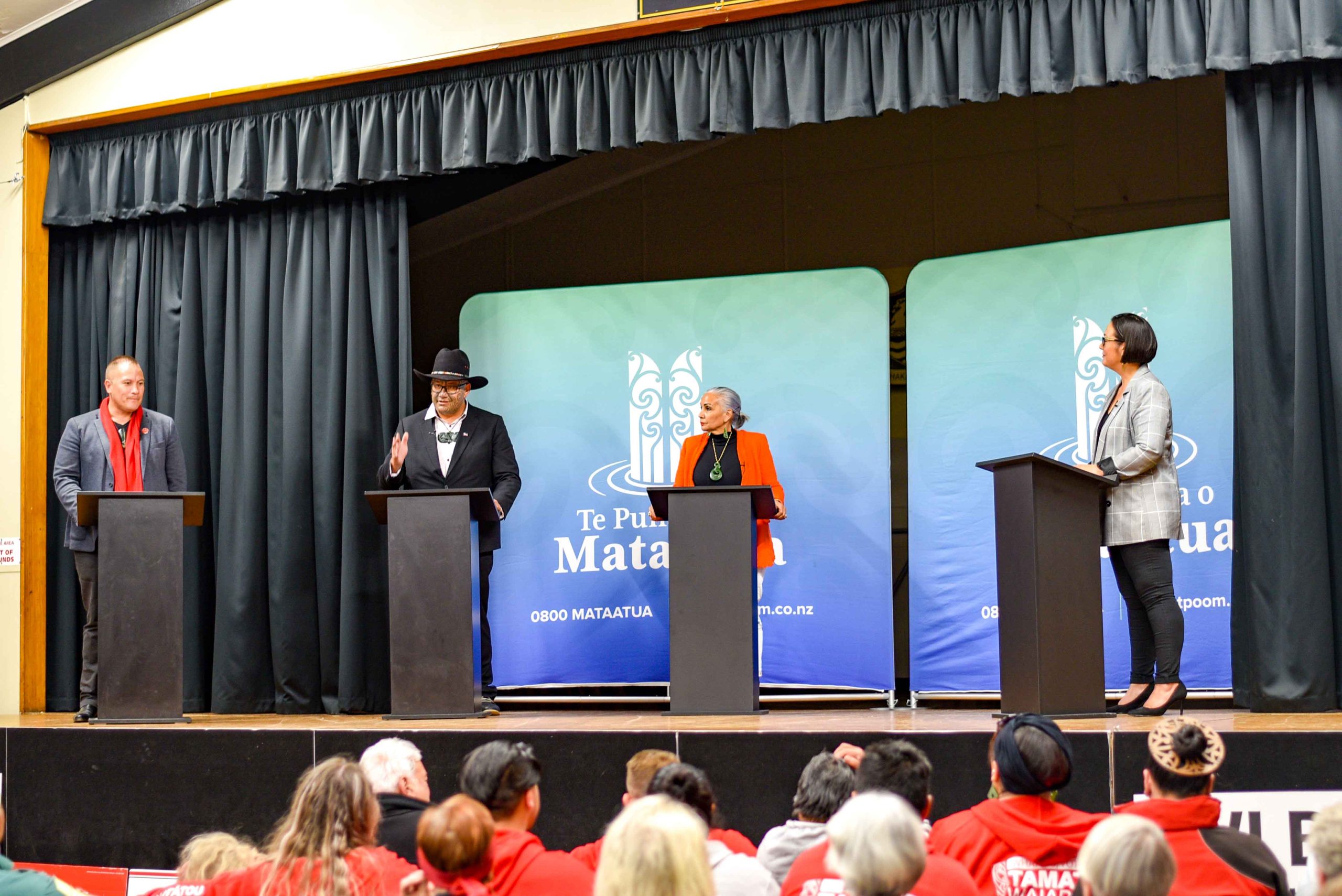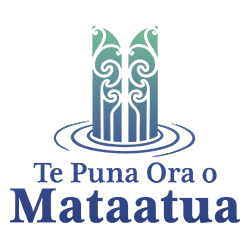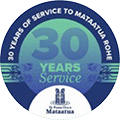3 Waiariki candidates go head-to-head-to-head in Whakatane
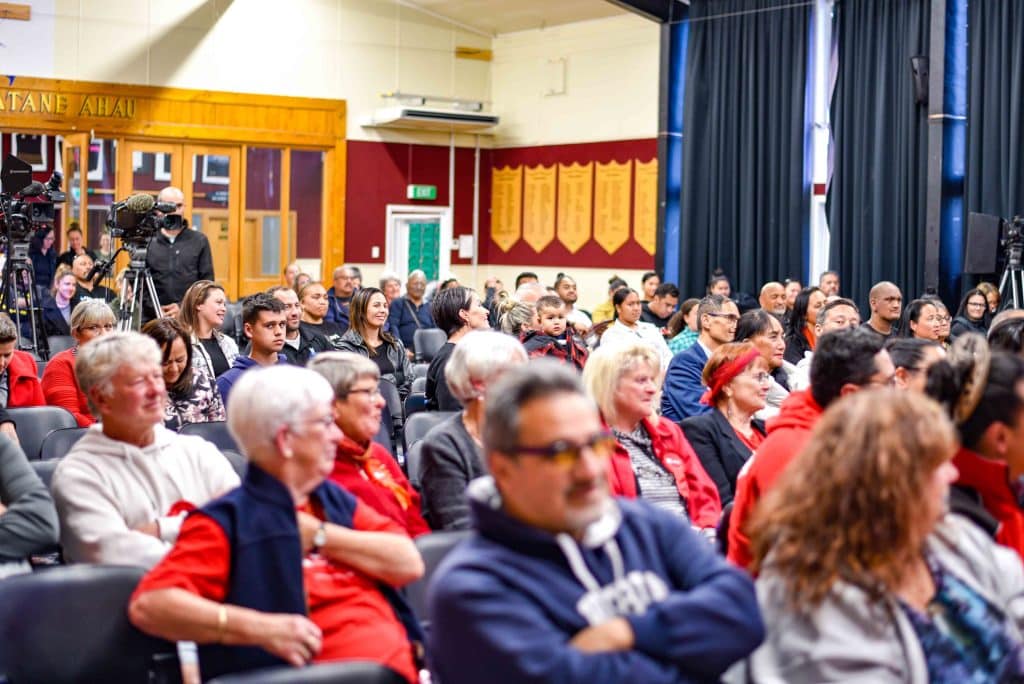
On September 30th, Vision NZ’s Hannah Tamaki, Labour MP Tamati Coffey, and the Māori Party’s Rawiri Waititi faced off in a lively debate, facilitated by Te Puna Ora o Mataatua. The three took to the podiums for just over an hour, sharing their ambitions for the Waiariki electorate and its people.
The candidates were pressed on issues including housing, water ownership, and supporting the Māori rainbow community. Opposing views on procurement led to some of the evening’s most heated exchanges. However, it was clear all three candidates agreed on at least one thing; when it comes to advocating for Māori voices, there’s still plenty of mahi to be done.
Addressing the region’s housing challenges
Housing was the first issue of the night, with debate moderator Jasmyn Pearson questioning Labour MP Coffey on the government’s Kiwibuild record, and the party’s plan to address the rising number of whānau housed in motels due to COVID-19. In response, Coffey pointed to the 40 state houses built in Whakatāne, and Labour’s plan to build up to 8,000 state houses across the country.
Māori Party representative Rawiri Waititi explained his party’s plan to introduce a tax on the “nearly 20,000 empty houses” that have been vacant for three months or more, with the goal to use the funds to build 2,000 homes on Māori land. An impassioned Waititi stated that if “50% of the people on the waiting list to go into social housing are Māori, we want 50% of that stock to go to Māori.”
The Māori Party also suggested putting a hold on immigration – prioritising getting New Zealanders into homes before opening the borders to new arrivals. This position was shared by Vision NZ leader Hannah Tamaki, whose response was similarly immigration-led. The Vision NZ Leader also shared a policy built on her personal experience, suggesting the re-establishment of the Māori Affairs Department and interest-free loans – which was how she was able to purchase her first home at 21.
Procurement opportunities for Māori-owned businesses
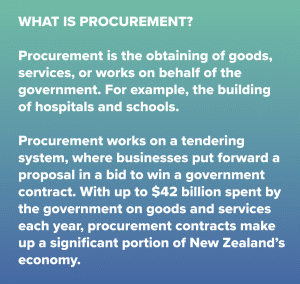
In what turned out to be the debate’s first ‘pou’ of many, Waititi announced he was “sticking a pou in the ground” over procurement. Namely, the Māori Party’s policy that 25% of government contracts should be awarded to Māori-owned businesses. Tamaki agreed that 20-25% of procurement should go to regional whānau ora commissioning agencies, and that Waiariki should be asking for “a piece of that pie.”
Discussion around current procurement percentages led to one of the evening’s most fiery moments, when Waititi stated that just 0.3% of procurement contracts have gone to Māori businesses under Labour. Coffey countered that the comment was “false” and “manipulating.” He suggested that, while the Vote Māori Development line did indeed get 3% of the budget, Māori interests are also serviced across other investment areas – including food in schools around Waiariki, Vote Housing, Vote Health, and Vote Social Development.
The issue of water ownership
The next topic on the agenda was water. The candidates were questioned on international companies’ ability to extract, bottle, and export billions of litres of New Zealand water each year. However, ownership proved to be the segment’s bigger talking point.
Pressed on who owns New Zealand’s water, all three candidates agreed that Māori have ownership. Waititi put his second ‘pou’ of the night into the ground, stating that Māori are the true kaitiaki of the water, and that treaty negotiations around water should be opened up immediately.
Tamaki also believed that Māori own the water. When asked whether Vision NZ would repeal all existing bottling consents to foreigners, Tamaki answered yes, saying “Māori need to be doing the deals themselves, not the local councils or government.”
Coffey’s initial stance was that all New Zealanders own the water. However, when pressed, he too stated his belief that ownership belongs to Māori. Coffey said that in any conversations around issues of ownership, Māori should have a seat at the table: “I’ll put my pou in the ground and say if I’m your MP for Waiariki past this election, I’ll make sure that the water ownership issue is dealt with.”
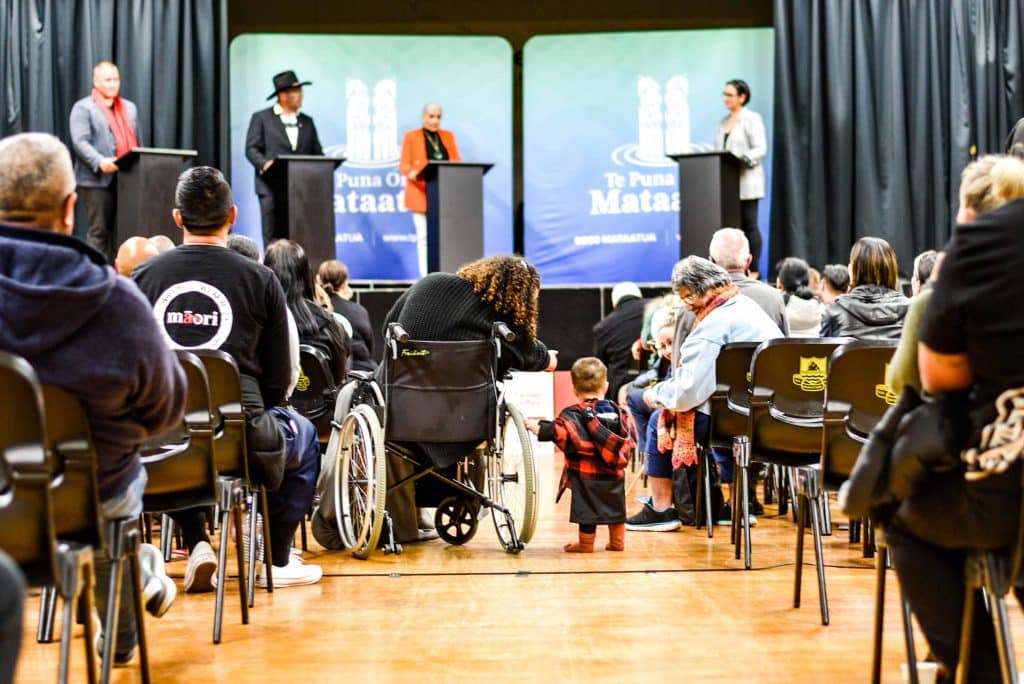
Supporting Waiariki’s rainbow community
In a question from the community, Rainbow EBOP co-founder Danae Lee raised concerns around the lack of specific LGBTQI policies from any of the three parties.
First right of response went to Waititi, who said, “we’ve got to start looking at the approach as a whole,” as opposed to creating interest groups that “divide and start to wehewehe ourselves.” Pressed by the moderator on policy, Waititi pointed to Whānau First – a policy that “allows all our people equal access to resources, to ensure we protect Māori people as a whole.”
Tamaki and Vision NZ held a similar belief, that “we are all one people.” Tamaki explained that her party doesn’t have different policies for different groups. “We’re standing in the Māori seat, so it’s for all Māori,” Tamaki said. “We’re not isolating or discriminating against people. We want the best for all Māori at all ages.”
Coffey’s response focused on encouraging LGBTQI support groups in high schools, and building resilience amongst vulnerable rangatahi. He also referenced Labour’s upcoming policy to ban conversion therapy – a concept which Waititi and Tamaki both stated they were unfamiliar with.
Highlighting healthcare for Māori
Vision NZ’s stance on healthcare was “Māori care for Māori.” Tamaki shared the party’s policy that healthcare should be free up to the age of 18, free for over-65s, and $2 a week for health clinic visits for Māori.
When asked whether his party believes DHB boards should be 50% Māori, Waititi said their preference was to bypass the DHB altogether – instead establishing a Māori Health Authority, run by Māori for Māori. In discussions around Oranga Tamariki, Waititi stated the controversial organisation should be disbanded, and replaced with a Māori-led authority.
Following discussions on Oranga Tamariki, Debate moderator Jasmyn Pearson listed several policies that the Māori Party has long fought for, which Labour successfully implemented in one term – including increasing the minimum wage, and making Matariki a national holiday. A verbal tussle broke out between Waititi and Coffey, leading to one of the debate’s lighter moments, when Tamaki told the two to “shush and be friends.”
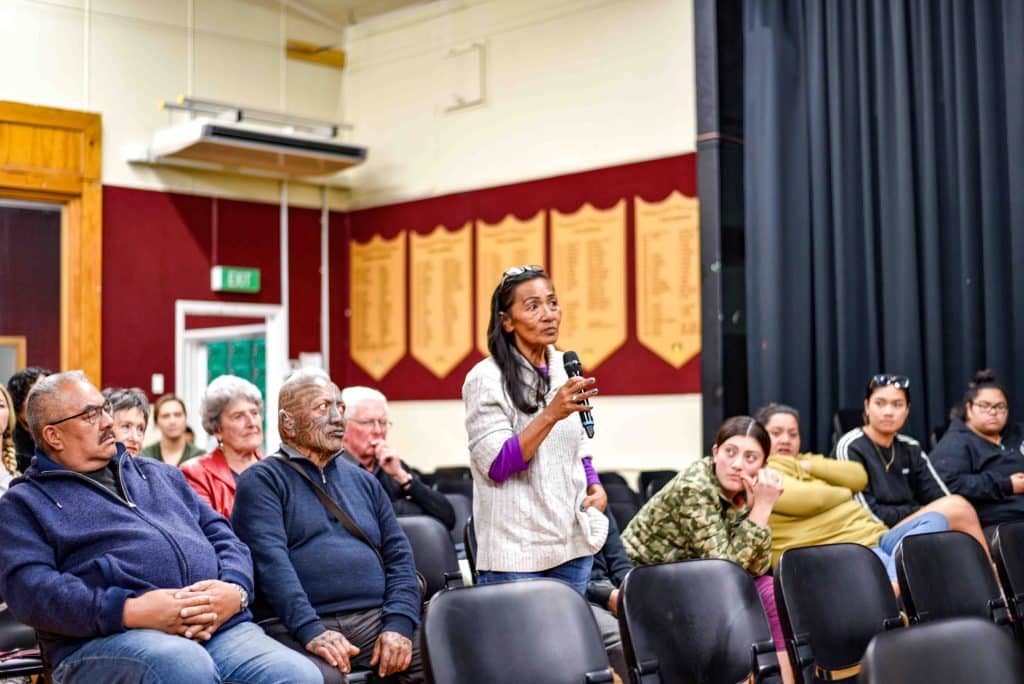
Questions from the community
Question time saw a range of topics floated by the floor. The first queried Hannah Tamaki’s views on gay marriage, which the Vision NZ Leader said she wouldn’t appeal.
Asked about trade training, all three candidates were firmly for it. Tamaki said her party is yet to write a policy on trades and apprenticeships, however, “I’m the leader. So if I say it, it’s going to happen.”
Waititi again pointed to procurement as the “game changer.” He stated that ensuring spaces are available solely for Māori would “lock our people into those jobs, and ensure there’s mahi at the end of it.”
Coffey pointed the finger at the last National government’s missed opportunity to train a new generation of tradespeople following the Christchurch earthquakes. As for Labour policies, he said the party would “put our money where our mouth is” – with plans to scrap apprenticeship fees, and reduce the financial barrier to study trades.
Wrapping up with closing statements
Closing statements saw the contenders thank Te Puna Ora o Mataatua for the venue (and the kai), moderator Jasmyn Pearson, and the audience for investing their time to attend.
Coffey’s closing focused on Labour’s track record, stating that while the party has made great progress, they need more time to finish what they’ve started. Tamaki expressed how much she’s enjoyed the campaigning journey so far, while Waititi referred to the lively debate as “particularly rowdy” and “a doozy.” Despite their ‘rowdy’ moments, it was evident the candidates shared more than just a stage – with all three’s passion for the people of the Waiariki coming across loud and clear.

